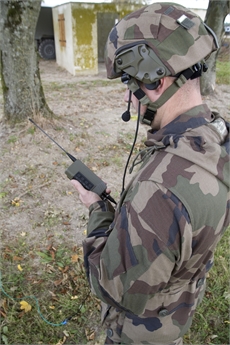FORT LESLEY J. MCNAIR, Washington, D.C. — The chairman of the Joint Chiefs of Staff today told graduates of the National Defense University here that their careers will be dominated by their understanding of the precise application of military force and national power.
NDU’s National War College and the Industrial College of the Armed Forces graduated 603 people from the armed services, civilian agencies and many foreign countries. U.S. Transportation Secretary Ray LaHood and King Abdullah of Jordan were among the guests.
The ability to project military power will continue to be a requirement in the future and the U.S. and its allies must be ready and able to apply that power across the full-spectrum of operations, Navy Adm. Mike Mullen said during his commencement address.
“From deterrence right on up to and including post-combat peace operations, we have within our respective services – and to our respective nations – a duty and a responsibility to provide our leaders options,” he said. “But one option we don’t have any more – if, indeed, we ever did – is to be indiscriminate.”
U.S. military force ought to be applied in a precise and principled manner, the chairman said. Since the Persian Gulf War, Americans have gotten used to watching videos of very precise aerial strikes, and the technology has improved over time. Precision has come to dominate conventional warfare, the admiral said, and it clearly is key to fighting a counterinsurgency campaign as well.
“In this case, precision is less about weapons accuracy than it is about intent,” Mullen said. “You need a light touch here, not a heavy hand. You need to be less intrusive and more insightful; less in control and more in support.”
This does not mean the military is becoming less lethal. “When you fight, you do so in as lethal and disciplined a fashion as possible,” Mullen said. “We cannot shrink from our duty to kill a ruthless enemy who himself murders and maims innocent people as a strategy.”
But even those situations demand deftness and precision because each errant bomb, each innocent person killed, works against a counterinsurgency strategy. “That is why the threshold for the use of indirect fire in Afghanistan is so high,” the chairman said.
That’s why Army Gen. Stanley A. McChrystal, commander of U.S. and NATO forces in Afghanistan, issued more restrictive rules for night raids. “And it’s why he has coalition troops operating in support of Afghan soldiers and not the other way around,” Mullen said.
Officers who have served in Iraq and Afghanistan know the importance of restraint, Mullen said. “We have learned this, some might argue, too slowly,” the admiral said. “We cannot kill our way to victory. We must build our way there, by building trust and confidence and good governance.”
Today’s military commanders also must be flexible in an age of irregular warfare, Mullen said, noting they may find themselves dealing with people who were shooting at them the day before.
“Such is the nature of the diverse threat we face – a complex, adaptive network of radical and violent ideologies that bind together disparate individuals, movements, organizations and even states,” he said. “Not all extremist groups share the same goals. Not all extremists themselves share the same ideology. We must differentiate and distinguish between them, divide them and turn them one against the other.”
Precise does not mean perfect, the chairman said, and being principled does not mean being uncompromising. “What I am saying is that our use of force needs to be discriminate and proportional and in keeping with the ideals of the citizens and the country we represent,” he said. “Our enduring national interests are bounded by our values, and our values are reflected in our conduct. What we do must ever be in keeping with who we are.”
Mullen emphasized that the lines dividing conventional and irregular warfare are becoming blurred.
“Future conflict will likely be even more complex and our array of engagement will continue to evolve,” he said. “I believe our investments should be allocated in a manner that recognizes this complexity and focuses on capabilities that allow maximum flexibility. It’s not about doing more with less. It’s about doing the right things with the right capabilities.”
Maintaining the edge in people, training and technology will be more important than quantity of systems and long-term weapons systems, the chairman said.
The future “favors responsibility and innovation in leaders, organization, technology – and in thinking,” Mullen said. “It requires us not just to apply kinetic force precisely – and when called for, decisively – but to recognize the responsibility we have to use that force appropriately.”
Source:
U.S. Department of Defense
Office of the Assistant Secretary of Defense (Public Affairs)

 von
von 